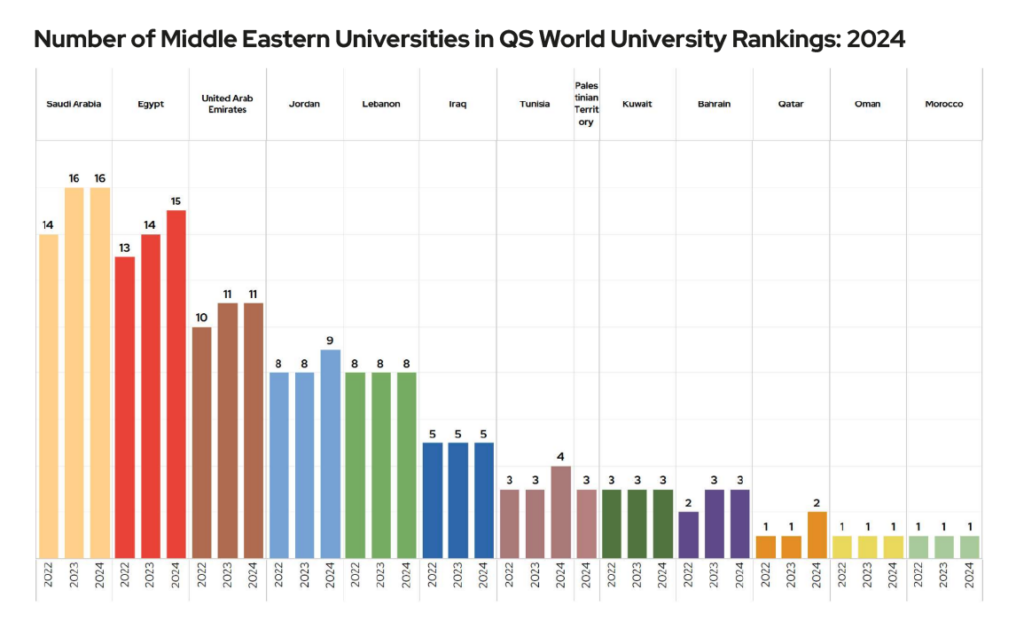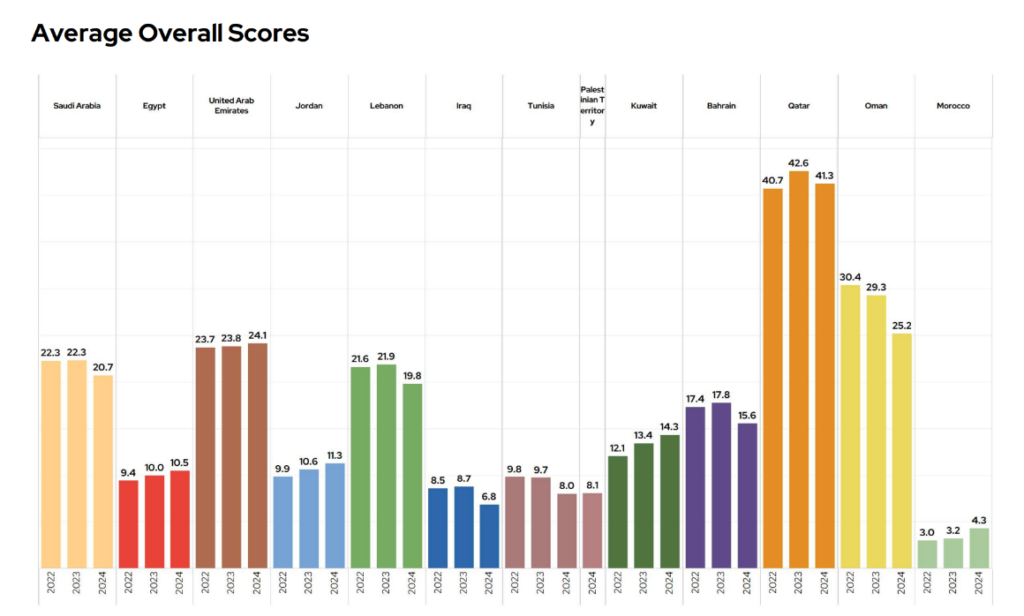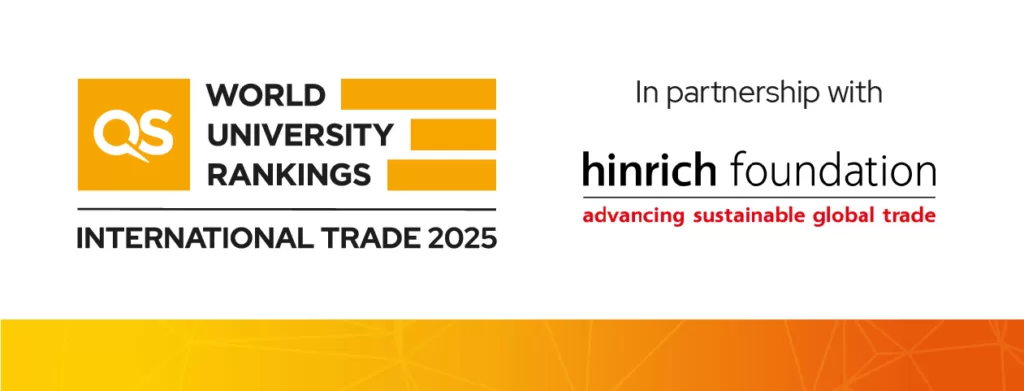
Over the past decade, the QS Arab Region University Rankings 2024 have offered a distinctive perspective on the advancement and evolution of higher education in the region. With a specific focus on the Arab Region, this ranking provides a context-driven examination of the intricacies of Middle Eastern higher education. It has served as a valuable tool for universities in the region to assess their performance and progress.
Leading voices in higher education joined us at the QS Higher Ed Summit: Middle East 2024 in a panel discussion: ‘Rankings and the Arab region’ to explore how Middle Eastern universities are using the rankings, what they are looking out for, the impacts of the rankings’ evolution and the importance of providing regional context in a globally connected higher education system.
Middle East’s ascension in ranked universities 2024
Speaking prior to the panel, Dr Ashwin Fernandes, QS Executive Director for AMESA said: “The regional rankings for the Arab region reflect the dynamic and evolving landscape of higher education in the region. Witnessing universities from diverse nations ascend in the QS World University Rankings underscores the growing emphasis on quality education, research, and internationalisation.
“As we look forward, QS envisions these rankings as catalysts for fostering a culture of continuous improvement and collaboration amongst universities, driving them to not only excel in traditional metrics but also in their contribution to societal challenges, thus embodying the spirit of innovation that is essential for our shared future.”

Deep dive on rankings in the Middle East:
- With 16, Saudi Arabia has the most institutions ranked in the QS World University Rankings 2024, followed by Egypt’s 15 institutions and the United Arab Emirates (UAE) with 11.
- Nations across the Arab region have seen an increase in the number of institutions featured in the rankings since 2022.
The importance of regional rankings in a global higher education landscape
Dr Fernandes said, “Considering the regional context in Arab university rankings is crucial for providing a more accurate and equitable assessment of higher education institutions globally. It ensures that the diversity of the regional landscape is celebrated and that students, educators, policymakers, and the public have access to information that reflects the realities and challenges on the ground.
“These regional insights are pivotal, as they mirror the unique educational, cultural, economic, and societal fabrics that shape institutions’ missions and achievements. Regional rankings prevent a one-size-fits-all approach and ensure that excellence across varied educational models is recognised and celebrated.”
Dr Riad Sakr Vice President for Administrative Affairs at American University of Science and Technology – AUST shared his perspective during the panel discussion, drawing from his experience at the 23-year-old Lebanese university:
“We believe it is important to have a ranking specifically for the Arab region because internationally, for a young university such as ours, it would be extremely hard to shine in front and amongst all these universities that are hundreds of years old. In Lebanon, we have a university that is 200 years old and is ranked in the top 10 in the region as well as the top 200 in the world – we cannot compete with that at this point.”
The impact of rankings on lower-ranked universities
Maryam Riaz, Advisor for Ministry of Education in the United Arab Emirates mentioned on the panel that while there are universities with lower scores, rankings can be utilised as a tool for encouragement in improving their institutional performance.
“For many political factors it may be difficult – for example some universities may be in economies that cannot provide more research labs, but they still have to try with whatever means they have.”
Exploring Middle Eastern institutions utilisation of QS Arab Region Rankings
Dr Riad Sakr, Vice President for Administrative Affairs at American University of Science and Technology shared insight on their University.
“Two years ago, we noticed that we weren’t in the international rankings, so when we looked at the Arab rankings and realised our numbers weren’t that good, it was because we didn’t have the proper data we needed to look at.
“We are looking forward to enhancing our reputation, working on our weaknesses and strengths, attracting more quality students and professors – which the rankings will help us to achieve.”
Professor Abhilasha Singh, Vice President for Academic Affairs at American University in the Emirates also provided insight: “The rankings provided us a kind of benchmarking in which we can see where we stand amongst other institutions and our own internal data. So, we developed a predictive model by utilising the QS Rankings Tracker which was very helpful because we could evaluate our progress amongst other peers more accurately.”
Changing fortunes

Looking at the average overall score year-on-year, institutions in Egypt, the UAE and Jordan have improved their average overall scores in the 2024 QS World University Rankings.
However, there has been a slight decrease in the average overall score for Saudi Arabia, Lebanon, Bahrain, and Oman, despite the same number of institutions being featured in the ranking as last year. For instance, Saudi Arabia’s average overall score has decreased by seven percent in 2024 compared to the previous two years.
Strategies for success
Dr Ashwin provides his expertise on factors Middle Eastern institutions can consider to help increase their reputation.
Focusing on regional partnerships: To establish top-of-mind recall within the Arab region. The substantial investment in infrastructure across many parts of the Arab region can attract high-impact researchers seeking to utilise the facilities.
Enhancing alumni engagement and participation: Universities have often fallen short of maintaining and leveraging databases of their alumni – Therefore, a larger remit to increase endowment through alumni funding is an opportunity waiting to be explored in the region.
Strategic branding: Going beyond logos and taglines – It encompasses the essence of an institution’s identity, values and the unique educational experience it offers. Arab universities and the region have a rich cultural heritage that resonates with both local and international audiences.
Effective storytelling: By universities sharing compelling stories about their groundbreaking research, successful alumni, community engagement initiatives and contributions to global challenges, universities can create an emotional connection with academics globally – showcasing the impact of their contributions and making them more attractive to a global audience.
Institutional branding and marketing: Although this aspect has focused on Arabic speaking communities and moving to English mediums on the vast digital network – it can help universities leverage their content and reach a larger audience.
Dr Ashwin concluded “What I have seen in recent times is that incorporating the voices of students, faculty, and alumni in storytelling efforts ensures authenticity and relatability. These personal stories can illustrate vibrant campus life, diverse communities, research opportunities, impact of their work and put Arab region universities in good light.”



